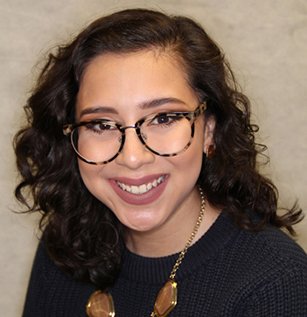Rebeca Rodriguez conducts workshop for nontraditional undergraduates

Practical tips on research experiences for undergraduates
When you haven't had access to numerous resources, traversing the terrain of applying to undergraduate research programs and graduate schools can be difficult. This is particularly true for non-traditional students from non-traditional trajectories into science, technology, engineering, and math fields.
Rebeca "Becky" Rodriguez, a 5thth-year graduate student working with Professor Christy Haynes, is passionate about making those routes into research programs and graduate school easier for the next generation of scientists, particularly more accessible to students of color.
Working with the University of Minnesota Student Chapter of the Society for the Advancement of Chicanos/Hispanics and Native Americans in Science (SACNAS), Becky put together a workshop for students attending local academic colleges and universities such as Metropolitan State, Augsburg, and Century College focused on what are called research experiences for undergraduates (REU) programs and fellowships. Through funding from the National Science Foundation, the University of Minnesota has a number of REU programs and opportunities, many of which are 8 to 10-week research experiences in the summer.
"When I was an undergraduate, I didn't even know what a REU was, and it was only due to mentors and advisers that I learned about them," said Becky. "Because I participated in an REU program at Duke, I was able to fill out graduate school applications showing that I had successful research experiences at both small and large institutions that taught me autonomy in a research setting," said Rodriguez.
Gathering as much information as possible on organizations and initiatives focused on diversity, and casting a wide net of emails out to contacts in the community, Becky pulled together a multi-experience workshop, which was conducted on Jan. 16. About 20 undergraduate students from around the metro area attended.
The workshop focused on teaching students about what an REU is, how the application process works, and practical hands-on tips on how best to showcase themselves on applications, cover letters, and resumes. They had the opportunity to meet with REU coordinators from a number of science areas such as chemistry, physics, biology, and math in small groups, to have lunch with professors, and tour laboratories and research facilities at the University.
Becky said that she hoped the workshop helped the students make connections with people who can help them, showed that there are students like them in the sciences, and that going to graduate school is feasible and possible. She intends to follow-up with the students to see if they applied for programs or what barriers prevented them from doing so.
She is moving forward with plans to conduct another workshop in the fall of 2020.For Becky, there should not be an extra layer of difficulty for students entering into REU programs or eventually graduate school because they are first-generation college students, are students of color, or come from non-traditional backgrounds. She is committed to doing her part to make that path easier for others. Through the online program, Científico Latino, she shares her expertise with students from throughout the country and world on how to apply to graduate school and fellowship programs. She has mentored students in Puerto Rico, Georgia, and Peru.
"Diversity is important," said Becky, "it enriches science and scientific research and, in that, we all benefit."